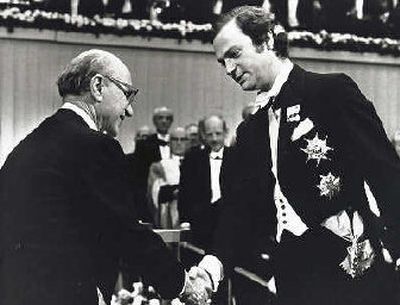Free enterprise advocate Milton Friedman dies

SAN FRANCISCO — Milton Friedman was the rare public intellectual whose ideas extended from the ivory tower to seats of power around the world.
So when the economist, a tireless proponent of free enterprise, died on Thursday it was fitting that he was lauded by former heads of state as well as his academic peers.
Friedman, who won a Nobel Prize in 1976, died in San Francisco, said Robert Fanger, a spokesman for the Milton and Rose D. Friedman Foundation in Indianapolis. He was 94. The cause of death wasn’t released.
Tributes quickly followed from universities, boardrooms and politicians.
The chair of the Federal Reserve said Friedman “had no peer.” Gov. Arnold Schwarzenegger recalled how Friedman influenced him before the one-time bodybuilder and actor became California’s governor.
“Milton Friedman revived the economics of liberty when it had been all but forgotten,” said former British Prime Minister Margaret Thatcher. “He was an intellectual freedom fighter. Never was there a less dismal practitioner of a dismal science.”
In numerous books, a Newsweek magazine column and a PBS show, Friedman championed individual freedom in economics and politics. The longtime University of Chicago professor pioneered a school of thought that became known as the Chicago school of economics.
Friedman’s theory of monetarism, adopted in part by the Nixon, Ford and Reagan administrations, opposed the traditional Keynesian economics that had dominated U.S. policy since the New Deal. He was a member of Reagan’s Economic Policy Advisory Board.
His work in consumption analysis, monetary history and stabilization policy earned him the Nobel Prize in economics in 1976.
“He has used a brilliant mind to advance a moral vision — the vision of a society where men and women are free, free to choose, but where government is not as free to override their decisions,” President Bush said in 2002. “That vision has changed America, and it is changing the world.”
Friedman favored a policy of steady, moderate growth in the money supply, opposed wage and price controls and criticized the Federal Reserve when it tried to fine-tune the economy.
A believer in the principles of 18th century economist Adam Smith, he consistently argued that individual freedom should rule economic policy. Friedman saw his theories attacked by many traditional economists such as Harvard’s John Kenneth Galbraith.
“He, more than any other person, has changed the composition and ideology of the economists’ profession,” said Paul Samuelson, a 91-year-old professor emeritus of economics at the Massachusetts Institute of Technology who was a contemporary liberal foil to Friedman’s conservatism.
In an essay titled “Is Capitalism Humane?” Friedman said that “a set of social institutions that stresses individual responsibility, that treats the individual … as responsible for and to himself, will lead to a higher and more desirable moral climate.”
Friedman argued that government should allow the free market to operate to solve inflation and other economic problems. But he also urged adoption of a “negative income tax” in which people who earn less than a certain amount would get money back from national coffers.
“Milton was one of the great thinkers and economists of the 20th century, and when I was first exposed to his powerful writings about money, free markets and individual freedom, it was like getting hit by a thunderbolt,” Schwarzenegger said in a statement.